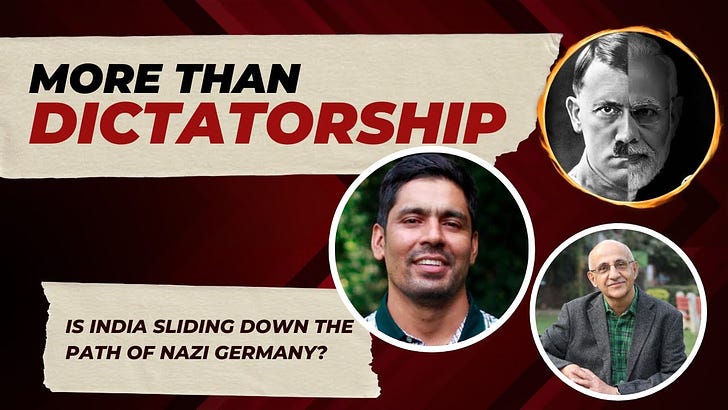Worse Than a Dictatorship: How India is Sliding Down the Path of Nazi Germany
A thoughtful conversation with an Indian intellectual who faces multiple lifetimes of jail for standing up for truth
With weeks to go before the general elections in India, a debate is raging: Is India now all but a dictatorship?
With opposition leaders in jail, integrity of vital institutions compromised and the state's unending war on freedom of expression, a few voices like that of youtuber Dhruv Rathee are challenging the near-monopoly of the state’s narrative in the public discourse.
The state of Indian democracy today is summed up nicely in a recent report from The Hindu about the recent V-dem report on democracy:
India, which was downgraded to the status of an “electoral autocracy” in 2018, has declined even further on multiple metrics to emerge as “one of the worst autocratizers”, according to the ‘Democracy Report 2024’ released by the Gothenburg-based V-Dem Institute that tracks democratic freedoms worldwide.
The V-Dem report categorises countries into four regime types based on their score in the Liberal Democratic Index (LDI): Liberal Democracy, Electoral Democracy, Electoral Autocracy, and Closed Autocracy. Their annual report, which maps each country on a matrix of whether they are turning more democratic (‘democratising’) or more autocratic (‘autocratising’), stated that in 2023, 42 countries (home to 35% of the world’s population) were undergoing autocratisation.
“India, with 18% of the world’s population, accounts for about half of the population living in autocratising countries,” the report said. Democratisation was taking place only in 18 countries, accounting for just 400 million people, or 5% of the world’s population.
According to the report, 71% of the world’s population — 5.7 billion people — live in autocracies, an increase from 48% ten years ago. The level of democracy enjoyed by the “average person in the world is down to 1985-levels”, the report said, with the sharpest decline occurring in Eastern Europe, and South and Central Asia.But what if this is not even the worst news for those who live in or love India? Does the problem go even deeper than this?
In other words, what if something akin to the developments in Germany in the pre-1933 years is going on in India right now?
What lessons does the German experience hold for countries like India where an authoritarian leader is all set to hijack the democratic apparatus after using elections to come to power?
This is where this interview with Harsh Mander that I recorded in February this year—when he was in Kathmandu for World Social Forum 2024—landed.
Here he paints a bleak picture of India's descent from a pluralist democracy to bigoted and hateful autocracy.
I can assure you that Mander is the best person to talk about this issue. Over past many years, he has devoted his life to documenting the worst hate crimes in India but he has done much more than that: he has literally gone to the homes of the victims of mass lynchings, consoled the bereaved families and felt their pain from up close.
In a country bereft of love and compassion, he is risking his life to show those virtues with his head held high.
I open the interview with reference to his recent piece in scroll.in, one among the handful of independent media outlets that still survive the Modi regime’s aggressive push to silence of co-opt the media. This grim title tells it all: Was it raw hatred or indifference? Why the lynching of a young Muslim man still haunts me.
And here is this recent piece with fine distillation of his insightful comparative study between today’s India and the pre-1933 Germany: It happened, so it can happen again – a journey through Auschwitz:
A 2023 survey by the Pew Institute revealed that 85% of the Indians interviewed preferred to be ruled by authoritarian or military rulers, more than in any other country in which the survey was held. I wished I could gently hold the hand of every Indian who feels elevated by the politics of hate and fear and unfreedom, and walk with them through the bleak grounds of Auschwitz. Let each of them at least know where the path that they have chosen for their people can ultimately lead.
Concurrently with the years that Adolf Hitler rose to power in Germany, and during the build-up to the Holocaust, leaders of the Hindu right in India spoke in glowing admiration of the ways that Hitler dealt with the “Jewish problem”.
For instance, in 1938, in the wake of anti-Jewish legislation in Germany, Vinayak Damodar Savarkar, a leading figure in the Hindu Mahasabha, suggested a similar fate for India’s Muslims. “A nation is formed by a majority living therein,” he declared. “What did the Jews do in Germany? They, being in minority, were driven out from Germany.”So, after all, are things really that bad in India today? You may rightfully ask this because India’s slide towards autocracy is often mentioned only cursorily in international media.
After talking to Mander for many hours in the course of two days, I have been convinced that the things are much much worse in India today than we can imagine from outside.
What is the historical trajectory through which we reached where we are in South Asia? What does the Modi regime’s cruelty towards the frail and elderly tribal rights activist speak about his insecurity?
And most importantly, what should we do to counter this ocean of hate and bigotry?
Let’s dive deep into these questions with Harsh Mander:
If you enjoy reading this newsletter, please forward this to a couple of your friends.



